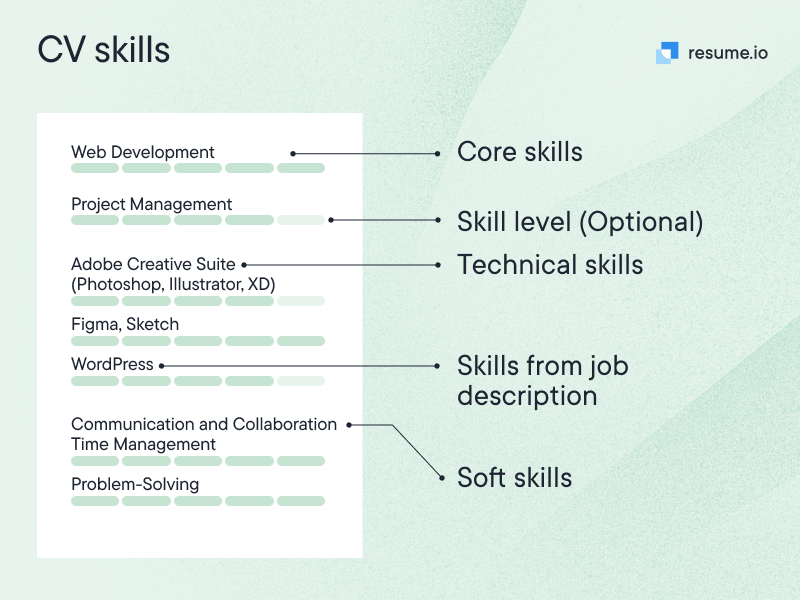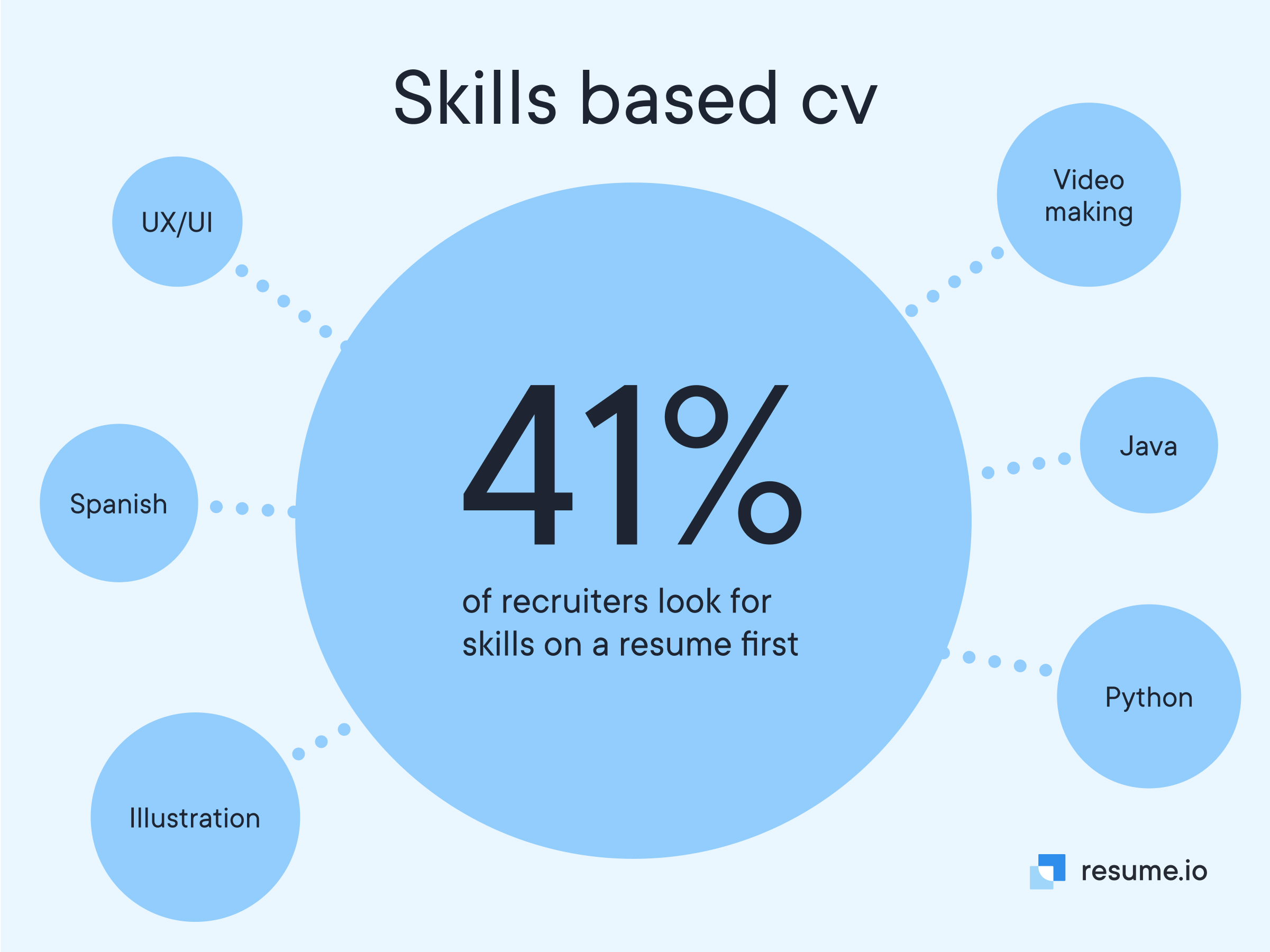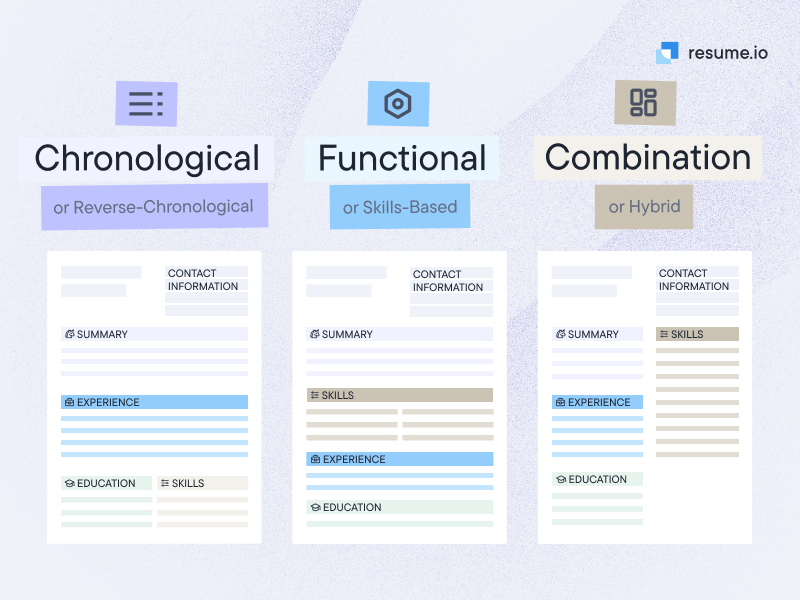Whether you’re a new career starter or you have years of experience under your belt, you’ve acquired a skill or two during your time. Your skills could be the strategic key to making you stand out in your job hunt.
But when is it strategic to lean into them with a skills based CV and when would that be doing you a disservice? Here at Resume.io, we have the resources you need to get ahead including a selection of CV examples and guides. This blog post will cover:
- What is a skills based CV?
- What to include in the format
- Pros and cons of using a skills based CV
- Common mistakes to avoid
- Your other options when it comes to CV formats.
What is a skills based CV?
A skills based CV, also referred to as a functional CV, is a CV that focuses on the skills and education of an applicant rather than their previous experience. Think of the skills section as the focal point of a skills based CV, whereas a chronological CV format revolves around the previous experience.
The work experience section in a functional CV is more condensed and less detailed compared to other formats. It is used to provide a brief overview of your work history without emphasising specific job roles or timelines.
On the other hand a skills based CV will have a well-developed skills section where you list your relevant skills and competencies. There will also be a strong focus on qualifications which can be relevant to list both in the skills section and in the education section of the CV format.
What are the sections of a skills based or functional CV?
Skills based CVs may revolve around skills and qualifications, but it’s important not to forget the other elements of a successful CV. Here are some of the sections you should make sure are present when you write a skills based CV:
- Resume Header: Every clear CV starts with your contact information, including your name, phone number, and email address.
- Professional Summary: Write a compelling summary that encapsulates your key strengths and what you bring to the table as a candidate. These are the two to four sentences that convince a hiring manager to keep reading.
- Skills Section(s): This is the heart and soul of your skills based CV. Show off your unique skill set with a list of keywords that will clearly express to the hiring manager that you have the expertise they require. List your skills in order of relevance to the job.

A skills section with a difference
If you have a wide set of skills that you want to explain, you can lean away from a traditional skills section which relies on short keywords. Consider dividing your skills section into multiple categorised sections.
- Education Section: In this section you should include your educational background, degrees, and any relevant certifications that prove you have the skills required.
- Work Experience: You can provide a concise overview of your employment history. Focus on relevant roles and achievements.

Why should you consider using a skills based CV?
When used in the right way by the right candidate, a skills based CV can be a strategic way to grab the attention of the hiring manager. This CV format will work best for people whose professional value will stand out more by highlighting their skills rather than their previous experience. If you are applying for a first job, you’re a student, or you are transitioning careers then a skills based CV could be for you.
Many hiring managers are most used to reading chronological CV formats. We’ll cover what this means later. While this is the preferred format for most jobs, the truth is that if your previous experience is not matching the calibre of the other applicants, then you are doing yourself a disservice by using this format and you will be unlikely to be called back for an interview.
Another exception to applicants who should favour the reverse chronological format when possible are technical skilled workers. Some professions which require very specific technical skills will be better presented in a skills based CV as opposed to focusing on listing out previous experience.
When should you avoid using a skills based CV?
Knowing when to avoid using a skills-based CV is just as important as understanding when it can work well for you. This format may not be suitable for everyone or every situation. Here are scenarios where you might want to reconsider opting for a skills-based CV:
If you possess an extensive and highly relevant work history that directly aligns with the job you're seeking, a reverse chronological CV might be the more effective choice. This traditional format allows you to showcase your career progression and a proven track record in the field you’re applying to work in.
Consider your industry
In some conservative industries, such as law or finance, a skills-based CV might come across as unconventional and out of place.
Equally, if your qualifications and skills don't significantly differentiate you from other candidates, then a skills-based CV might not provide a substantial advantage. If you still lack the experience to make your profile stand out, there are other formats you can consider. We’ll break these down later in this blog post.
Alternative CV formats
While a skills based CV — also known as a functional CV — can be a strategic choice for many professionals, there are alternatives you can choose from. Here are a couple of CV format options to think about.

Reverse chronological CV
The reverse chronological CV is the gold standard of resume formats, and for a good reason. It's straightforward and easy to follow. It places your most recent job at the top and then lists your previous roles in reverse chronological order. This format is an excellent choice if you have a solid work history with positions that align with your career goals.
However, this format may not be the best fit for everyone. If you're in the middle of a career transition or are a recent graduate with limited work experience, the reverse chronological format might not showcase your value effectively.
Hybrid CV
The hybrid CV combines the strengths of both the chronological and skills based CV formats. This format starts with a resume header and professional summary, just like a traditional CV. However, it places a strong emphasis on the skills section, allowing you to showcase your expertise upfront.
This can be a big advantage if your professional experience is thin but it still offers some relevant points you want to clearly communicate to the hiring manager..
Tell a story with your CV
A key advantage of the reverse chronological format is that it highlights your career progression. This makes it easy to build a story for your prospective employers about your professional growth over time. The approach can help hiring managers to feel confident that you’ve got the expertise and attitude they need.
Challenge yourself to think of ways to tell a story through your CV about why you’re the best fit for the job, regardless of the format you choose!
If you’re still unsure of which CV format is the best for your unique profile and which one you should adopt, consider taking a moment to reflect before you start writing.
Mistakes to avoid when writing a skills based CV
- Irrelevant skills: One of the most crucial mistakes is listing skills that aren't directly relevant to the job you're applying for. You should showcase your top abilities, but focus on those that align with the specific requirements of the position.
Tailor your CV to the job at hand
Tailor your skills-based CV to each job application. Don't use a one-size-fits-all approach. Analyse the job description carefully. This will give you the best results when you are customising your skills section to match the specific requirements of the role.
- Generic list of skills: Vague or overly broad skills can weaken your CV. Instead of stating generic skills like "communication" or "problem-solving," mirror the language of the job description. You can even make your skills hyper-specific to tell the hiring manager a story of why it is relevant or valuable. For instance, rather than “digital marketing”, a specific alternative could be “Doubling audiences through Facebook advertising campaigns”.
- Not quantifying your achievements: Look for opportunities to add credibility to your claims and give employers a clear sense of your contributions. Use the above example about digital marketing to brainstorm some creative ways to quickly communicate specific skills and attach impressive statistics or numbers to them.
- Under or overemphasising soft skills: Balance your skills section with a mix of both soft and hard skills relevant to the job. While technical skills are important, soft skills such as adaptability, leadership, and problem-solving are highly valued by employers. Present a well-rounded picture of your expertise.
- Excessive detail: It's important to strike a balance between providing enough detail to demonstrate your skills and avoiding overwhelming the reader with information. Keep your skills descriptions concise and relevant. Aim to create a clear and easily scannable document.
- Ignoring keywords: Many employers and applicant tracking systems (ATS) scan CVs for keywords related to the job. Make sure to incorporate relevant keywords from the job description into your skills section. This increases the likelihood of your CV getting noticed by both recruiters and automated systems!
Key takeaways
- Skills based CVs emphasise skills and education over work experience. This format could be a great option for those starting or transitioning their career.
- You might want to avoid this format if you have extensive relevant experience for the job you’re applying to or are in conservative industries.
- Choose your CV format carefully for each job application to make sure your professional profile will be received in the best way possible.
- Lean into the flexibility of a skills based CV or another CV format to make sure your CV works for your unique skill set, professional history, and career goals.




